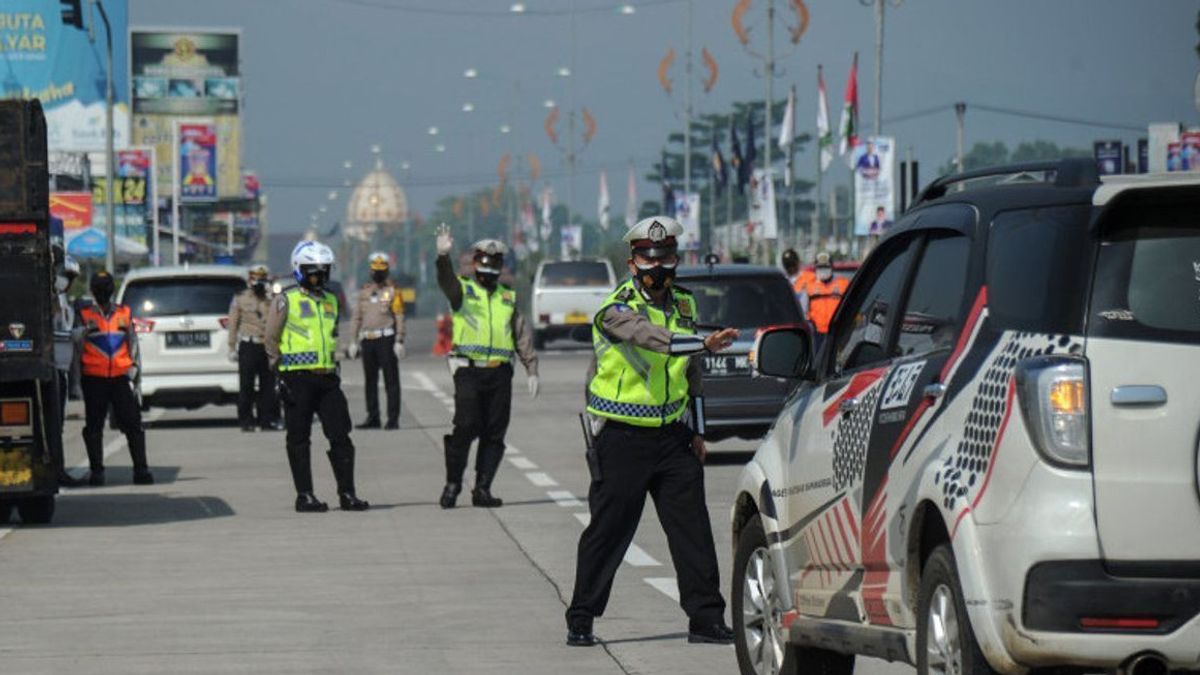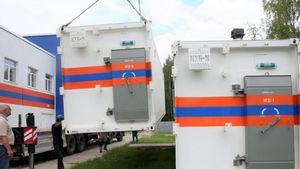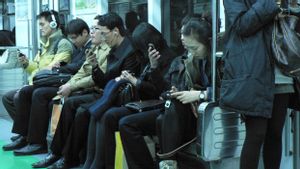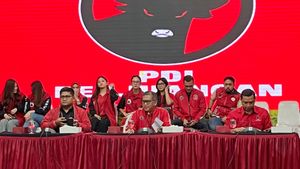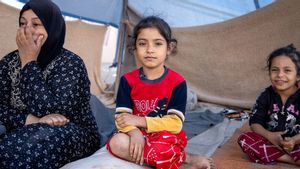JAKARTA - Minister of Home Affairs (Mendagri) Tito Karnavian has issued Minister of Home Affairs Instruction Number 35 of 2021 concerning PPKM Level 4, Level 3, and Level 2 COVID-19 in the Java and Bali Region which is valid until August 30.
In the Ministry of Home Affairs, there are still a number of regencies/cities that apply PPKM Level 4. Several agglomerations are still implementing PPKM Level 4, such as Solo Raya and Malang Raya.
In West Java, PPKM Level 4 was implemented in Cianjur Regency, Sukabumi City, Sukabumi Regency, and Cirebon City.
In Central Java, PPKM Level 4 was implemented in Boyolali Regency, Purbalingga Regency, Wonogiri Regency, Sukoharjo Regency, Klaten Regency, Kebumen Regency, Banyumas Regency, Tegal City, Surakarta City, Salatiga City, Magelang City, Sragen Regency, Purworejo Regency, Cilacap Regency , and Karanganyar Regency.
In Yogyakarta, PPKM Level 4 is implemented in all regions, namely Sleman Regency, Bantul Regency, Yogyakarta City, Kulonprogo Regency, and Gunungkidul Regency.
In East Java, PPKM Level 4 was implemented in Tulungagung Regency, Madiun Regency, Malang City, Madiun City, Kediri City, Blitar City, Batu City, Trenggalek Regency, Malang Regency, Ponorogo Regency, Ngawi Regency, Magetan Regency, Probolinggo City, Kediri Regency , Jombang Regency, Blitar Regency, Banyuwangi Regency, and Lumajang Regency.
In Bali, PPKM Level 4 was implemented in Jembrana Regency, Bangli Regency, Karangasem Regency, Badung Regency, Gianyar Regency, Klungkung Regency, Tabanan Regency, Buleleng Regency, and Denpasar City.
The following are PPKM Level 4 rules in Java-Bali:
a. the implementation of teaching and learning activities in education units is carried out: 1) through distance learning; and 2) a maximum of 25 percent of educators and/or education staff in each education unit can carry out technical preparation activities (simulations) for the National Assessment on August 24, 2021 to September 2, 2021.b. the implementation of activities in the non-essential sector applies 100 percent WFH;
c. implementation of activities in: 1) essential sectors such as a) finance and banking only covers insurance, banks, pawnshops, futures exchanges, pension funds, and financial institutions (which are oriented to physical services with customers); b) capital markets (which are customer-oriented); on services with customers (customers) and the running of capital market operations well; c) information and communication technology covering cellular operators, data centers, internet, postal, media related to the dissemination of information to the public; d) non-quarantine handling hotels; and f) export-oriented and supporting industries wherein the company must show proof of sample documents for Notification of Export of Goods (PEB) for the last 12 months or other documents showing export plans and are required to have an Operational Permit and Mobility of Industrial Activities (IOMKI) by taking into account the technical arrangements from the Ministry Industry, can operate provided that: a) for letter a) can operate with a maximum capacity of 50 percent of staff for locations related to services to the community, and 25 percent for office administration services to support operations; b) for letter b) up to letter b) d) can operate with a maximum capacity of 50 staff; and c) for letter e) can only operate with shift arrangements with a maximum capacity of 50 percent of staff for each shift only in production facilities/factories, and 10 percent for office administration services to support operations,2) essential in the government sector that provides public services that cannot be delayed, the implementation is enforced by 25 percent of the maximum WFO staff with strict health protocols; 3) critical matters such as: a) health; b) security and order; c) disaster management; d) energy; e) logistics, transportation and distribution, especially for needs. community staples; f) food and beverages and their supports, including for livestock/pets; g) fertilizers and petrochemicals; h) cement and building materials; i) national vital objects; j) national strategic projects; k) construction (public infrastructure); l) basic utilities (electricity, water and waste management), can operate provided that: a) for letters a) and b) can operate 100 percent of staff without any p exceptions; and b) for letters c) up to letter l) can operate 100 percent maximum of staff, only in production/construction/service facilities to the community and for office administration services to support operations, a maximum of 25 percent of staff applies; c) companies included in sector in letter d), e), f), g), h), k), and l) are required to use the PeduliLindung application starting September 6, 2021 to screen all employees and visitors entering production/construction/ office administration services and areas; and d) companies that are included in the sector category according to letter c must obtain a recommendation from the technical ministry of sector guidance before being able to gain access to use the PeduliLindung application, 4) for supermarkets, traditional markets, grocery stores and supermarkets that sell daily necessities, limited operating hours up to 20.00 local time with a visitor capacity of 50 percent; and 5) pharmacies and drug stores can be open for 24 (twenty four) hours,
d. the people's market that sells non-daily necessities can operate with a maximum capacity of 50 percent and operating hours until 15.00 local time;
e. street vendors, grocery stores, voucher agents/outlets, barbershops/barbershops, laundry, hawkers, small workshops, vehicle washes, and others of the like are allowed to open by implementing strict health protocols until 20.00 local time which is regulated technically carried out by the local government;
f. implementation of eating/drinking activities in public places: food stalls/warteg, street vendors, hawker stalls, and the like are allowed to open with strict health protocols until 20.00 local time with a maximum of 3 visitors eating at the place of 3 people and a maximum meal time of 30 minutes . Subsequent technical arrangements are regulated by the local government; 2) restaurants/restaurants, cafes with locations located in closed buildings/stores, both in separate locations and those located in shopping centers/malls only accept delivery/take away and do not accept meals at a place (dine in) whose technical arrangement is determined by the local government; and 3) restaurants/restaurants, cafes with service areas in open spaces are allowed to open with strict health protocols up to 20.00 local time with a maximum capacity of 25 percent, one table for a maximum of 2 (two) people, and a maximum meal time of 30 minutes which is arranged technically determined by the local government,
g. activities at shopping centers/malls/trading centers are temporarily closed unless access for store employees who serve online sales with a maximum of 3 people per shop, restaurant, supermarket, and supermarket can be allowed;
h. for Sleman Regency, Bantul Regency, Yogyakarta City, Kulonprogo Regency, and Gunungkidul Regency, Wonogiri Regency, Sukoharjo Regency, Sragen Regency, Surakarta City, Klaten Regency, Karanganyar Regency, and Boyolali Regency, a trial implementation of health protocols was carried out in shopping centers/malls/centers. with the provisions: 1) activities at shopping centers/malls/trade centers are allowed to operate 50 percent from 10.00 to 20.00 local time with health protocols regulated by the Ministry of Trade; 2) are required to use the PeduliLindung application to screen all visitors and employees of related shopping centers/malls/trade centers; 3) restaurants/restaurants, cafes with internal locations located in shopping centers/malls only accept delivery/take away and do not accept dine-in;4) Residents under the age of 12 years and above 70 years are prohibited from using enter a shopping center/mall/trade center; and 5) cinemas, children's playgrounds, and entertainment venues in shopping centers/malls/trade centers are closed,
i. implementation of construction activities for public infrastructure (construction sites and project sites) operates 100 percent and small-scale construction is allowed a maximum of 10 people by implementing stricter health protocols;
j. places of worship (mosques, prayer rooms, churches, temples, monasteries, and pagodas as well as other places that function as places of worship), can hold congregational worship/religious activities during the implementation of PPKM Level 3 with a maximum of 50 percent capacity or 50 people by implementing health protocols more strictly by taking into account the technical provisions of the Ministry of Religion;
k. public facilities (public areas, public parks, public tourist attractions and other public areas) are temporarily closed;
l. arts, culture, sports and social activities (locations of arts, culture, sports facilities and social activities that can cause crowds and crowds) are temporarily closed;
m. public transportation (public vehicles, mass transportation, taxis (conventional and online) and rental/rental vehicles) is enforced with a maximum capacity setting of 50 percent by implementing stricter health protocols;
n. the implementation of the wedding reception is abolished;
o. domestic travelers who use private cars, motorbikes and long-distance public transportation (airplanes, buses, ships and trains) must: 1) show a vaccine card (at least the first dose of vaccination); 2) show H-2 PCR for aircraft air and antigen (H-1) for transportation modes of private cars, motorcycles, buses, trains and ships; 3) the provisions as referred to in number 1) and number 2) only apply to arrivals from outside Java-Bali or departures from Java and Bali to outside Java and Bali, and does not apply to transportation within the agglomeration area for example for the Jabodetabek area; 4) Traveling by airplane between cities or districts within Java-Bali can show a negative antigen result (H-1) on condition that have received the second dose of vaccination, and the results of H-2 PCR are negative if they have just received the 1st dose of vaccine; and 5) drivers of logistics and other goods transportation vehicles are exempt from the provision of having a vaccine card,
p. continue to wear masks correctly and consistently when carrying out activities outside the home and are not allowed to use face shields without wearing a mask; and
q. the implementation of the Micro PPKM in the RT/RW of the Red Zone is still enforced by activating the command posts at every level by looking at the zoning criteria for regional control.
The English, Chinese, Japanese, Arabic, and French versions are automatically generated by the AI. So there may still be inaccuracies in translating, please always see Indonesian as our main language. (system supported by DigitalSiber.id)
